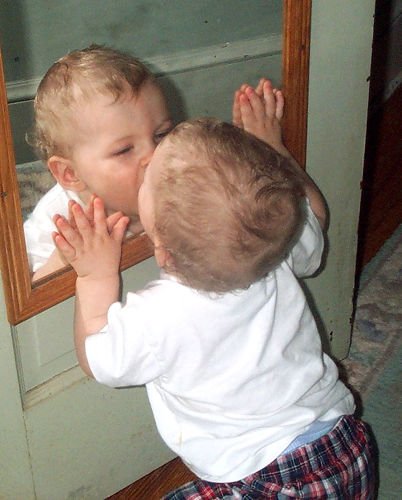The unbearably schmaltzy story is back – now edited according to your suggestions!
Big stuff that changed:
- I kept the Times job, but gave our heroine a little more control over her emotions
- I made up a specific memory from the relationship to be more showy, less telly
- I reworked the boss’s character based on the “you look like a zebra” line from the original
- I deleted some fluff, and with what I added, it made for a story about 100 words shorter
I also tweaked some wording and corrected some tense inconsistencies – with all three tenses in the story, it was easy to get them mixed up. (Read the original here.)
So kick back with some bon bons and let me know what you think!

Phhoto by Jodi Michelle
Fraternization
It’s the first day of my dream job. Everything is perfect. I sit at my mahogany desk and try not to cry.
I didn’t even apply for this job. The offer came out of the blue, on the heels of seven other unsolicited offers. Higher salaries, better benefits, but I turned them all down. I didn’t want to leave him.
But I couldn’t resist this one.
The worst part was telling him. I was shaking that morning as I rode the elevator to the fourth floor. No amount of daisy-petal pulling could compare to this moment.
I was finally going to find out if he loved me.
I imagined how it would go – you know, fairy-tale scenario.
I’ve received an offer for the editor position at the Times, I’d say, You know how much I love working here, but this is the job I’ve dreamed about for as long as—are you alright?
I’d interrupt myself at this point because I’d notice how crestfallen he had become.
Christy… he’d stammer, I just…don’t think I’m ready to lose you. I know I’ve never told you how I felt, but—I’ve always loved you.
Of course that wouldn’t happen. But I was hoping for at least a hint of disappointment. Something that would show he cared for me as more than—well, you know.
I arrived at his office. His door was open, as usual, but he was hunched over his address book. I knocked; he looked up. He looked tired, sad, nigh despairing! I wondered if he’d already heard. If he was already grieving for me. He welcomed me in, his eyes searching my face. I sat down across from him, took a deep breath.
“I’ve received an offer,” I began. His expression froze. “For a job,” I dropped my gaze to my fingers, twisted in my lap. “As an editor. At the Times. It’s um—”
“Christy, that’s fantastic!”
Fantastic. Fan-bloody-tastic. His whole face lit up when he said it.
I dutifully put in my last two weeks, but it didn’t get any better. The best I could get out of him was “We are going to miss you around here.”
We. Not I.
It’s replaying that part of the conversation that makes me finally break down. I know it sounds stupid, but when you meet another human being who not only knows but appreciates James P. Blaylock books as much as you do, and who volunteers to waste an entire Monday with you trying to recreate Cap’n Binky’s burnt-jungle-mud coffee from The Disappearing Dwarf because you’re still trying to get over your mom’s death, well. It’s hard to come to terms with the fact that you’ll probably never see him again.
And here in my new office, I don’t even know where the tissues are. I’ll have to make a break for the bathroom to bawl my eyes out on a roll of toilet paper.
I collide with my new boss as I’m bursting into the hallway.
“What’s the matter with you?”
“Nrrthing,” I say—the first half of the word drowning in my snotty throat.
She arches an eyebrow. “Has someone died?”
I shake my head.
“Seriously injured? Diagnosed with cancer?”
“No, no. Everything’s fine. Just…allergies.”
“Well good. As highly as Steve recommended you, I’d hate to find out you were one of those hypochondriacal schoolgirls who’s always dealing with some kind of crisis.”
“Recommended me…” heart drops to gut. “What?”
But I already understand.
He knew I was in love with him. I hadn’t hidden it as well as I thought. And rather than hurt my feelings, he found a better position for me elsewhere. All those offers. He must have been calling in favors all over town.
“Shoot,” (she uses a different vowel) “I wasn’t supposed to tell you that.”
I can feel my mouth twisting up as I lose control of the muscles in my face. But four feet of no-nonsense pantsuit stand between me and the ladies’ room, and I know if I open my lips to excuse myself, all that’ll come out is a sob.
“Oh,” she squints at me. “I know what’s going on.”
She pushes me back into my office and shuts the door. Now my chin is trembling. Barely five hours at this job and I’m going to get fired.
She bends down to open a cupboard. “If she’s so perfect for the job, I said, why the heck”—she uses different consonants—“are you trying to get rid of her? And do you know what he said?”
I sniff, shaking my head.
“Because—and these were his exact words—‘I constantly have to remind myself not to kiss her.’ You see?”
I stare at her.
She hands me a box of tissues. “Your boss couldn’t make a move while you still worked there. It’s got to be against company policy, right?”
“He…he didn’t say that…”
“Are you calling me a liar?” she plants her hands on her hips.
“I…” I’m floundering now, lightheaded. “That’s not…”
“And now here he comes to take you to lunch, and I’ve screwed up the surprise.”
She’s looking out the window down at the parking lot. I lean forward to see. It’s him. Heading for the door like he’s on a mission. A bunch of flowers in his hand.
I look at my new boss. She grins. “Told you.”
I smile. I forget to breathe.
“You have about twenty seconds to get that eyeliner cleaned up. You look like a zebra.”
She turns on a heel and walks out. I scramble for more tissues.
First day of my dream job. Everything is perfect.






